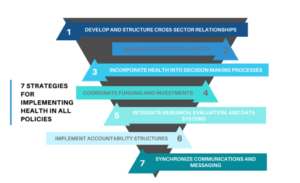New Policy Statement Positions NACCHO as a Key Leader in Addressing Local-Level Health Impacts of Climate Change
The current and projected health outcomes of climate change-related events have catapulted climate and health to the forefront of public health worldwide and highlighted the urgent need for resources and educational materials that inspire, empower, and encourage public health leaders and community members to take action. In response to this need, the National Association of County and City Health Officials (NACCHO), has updated and developed resources for local health departments in the United States that promote climate and health, a crucial public health issue and health equity effort.
We are excited to announce an updated NACCHO Climate Change Policy Statement which was recently reviewed by the NACCHO Climate Change Workgroup to reflect the organization’s stance on the issues, also gaining overwhelming approval from the NACCHO Board. The workgroup, comprised of local public health officials, environmental health professionals, environmental health directors, and subject matter experts, plays a major role in developing policy statements as they provide direct insight into the happenings and needs of communities at the local level. Based on their collective input and aided by published studies on the topic, the new policy statement strongly urges public health departments and agencies at the local, state, tribal, territorial, and federal level to collaborate with each other and with community members to ensure equitable preparation and response efforts. The update also includes a breakdown of the Center for Disease Control’s (CDC’s) 10 Essential Public Health Services to address ways in which local health departments can equitably prepare for and respond to, the health impacts of climate change.
To deepen the role of health equity and weave it into public health policy, NACCHO released the Seven Health Department Strategies for Implementing Health in All Policies to Combat Climate Change fact sheet. This fact sheet focuses on the importance of Health in All Policies (HiAP) and ways to incorporate health considerations into planning and program decisions through seven identified strategies and recommendations:


The seven strategies provide a framework for local health departments to ensure their programs and planning processes incorporate health equity and can serve as a catalyst for HiAP to be considered among cross-sector partnerships.
With support from the CDC, NACCHO manages the Climate and Health Adaptation Program, which awards local health departments with funding to supplement ongoing climate change and health adaptation initiatives. The program focuses on preparing communities for extreme and unusual environmental events, as well as developing partnerships with local governments on all hazard disaster planning. Our latest grantees from 2021 completed work in Clackamas, Multnomah, Washington Counties (Oregon), Harris County (Texas), and Franklin County (Ohio).
To help foster partnerships that can ultimately mitigate the health effects of climate change, NACCHO served as an endorser of the 11th annual American Climate Leadership Summit 2022 (ACLS 2022, on March 28-31). The National Health and Climate Forum, which was held on March 30, featured climate leaders in the health community on topics including mental health, local health leadership, and climate change and disabilities. View HERE. NACCHO also partnered with ecoAmerica to present the Climate for Health Climate Ambassador training at the 2022 Preparedness Summit in Atlanta, GA. You can take the training online, at your own pace. Find out more and sign up here.
- For HiAP information or resources, contact NACCHO at PHLaw@NACCHO.org. or visit https://www.naccho.org/programs/community-health/healthy-community-design/health-in-all-policies.
- For climate change information, contact NACCHO at environmentalhealth@NACCHO.org or visit https://www.naccho.org/programs/environmental-health/hazards/climate-change.
- How to use the NACCHO Bookstore: To download the HiAP factsheet from NACCHO’s Bookstore, click here. Using a MyNACCHO account, check out the publication through the online store. Have questions? Email avarma@naccho.org.